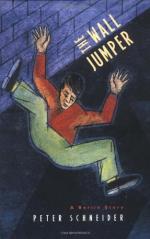
|
| Name: _________________________ | Period: ___________________ |
This test consists of 5 short answer questions, 10 short essay questions, and 1 (of 3) essay topics.
Short Answer Questions
1. What is the UN resolution on the evening news about that the Narrator watches on television?
2. What does the Narrator travel into East Berlin on?
3. On the East German map, what is lacking in the West German side?
4. Whose government does the Narrator find more intrusive on citizen privacy?
5. On his first visit to the wall, what does the Narrator watch?
Short Essay Questions
1. What did the early 1960s see in Berlin in terms of escape methods in Berlin?
2. What does the woman with bulging eyeballs who visits Pommerer have to say about solidarity?
3. How did Lena's family treat her when she visited with the Narrator in East Berlin?
4. How does Schneider uses the analogy of lovers to explain the German lack of interest in reunification?
5. How does Kabe outwit both the East and West German governments?
6. How do the DDR and the Western television reflect bias when it comes to news reporting?
7. What is the story that Pommerer tells the Narrator about the Willy boys and their friend Lutz concerning the Wall?
8. How is the difference in the importance of the Wall shown in Western and Eastern maps?
9. Describe how the East and West Germans are different at the Schönefield Airport.
10. How has television affected the culture of the two German societies?
Essay Topics
Write an essay for ONE of the following topics:
Essay Topic 1
What is the significance of the Wall? When was the Wall erected? How does it divide Berlin? How does it divide the people of Berlin? What does the Wall symbolize? What international relationships are changed as a result? Who gains or loses power?
Essay Topic 2
The Narrator uses more than one iteration on the theme of loss. Identify at least two themes about loss in the stories he shares in "The Wall Jumper". Then cite an example to support your answer.
Essay Topic 3
One of the main themes in the book is ethical and social responsibility. List at least four examples where Schneider employs this specific theme. Is the battle between making ethical choices obvious or subtle? What characters are involved in this kind of battle? Do you think the right person or group won? Does good always triumph over evil in the case of "The Wall Jumper" ethics? Where do these definitions appear vague or incomprehensible?
|
This section contains 822 words (approx. 3 pages at 300 words per page) |

|




